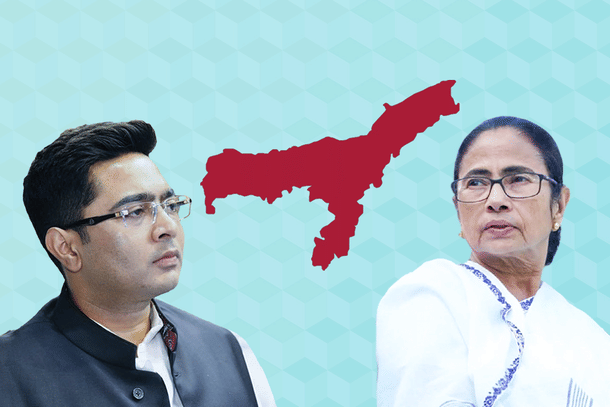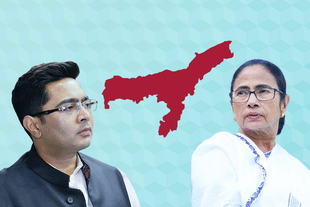Commentary
Twice Bitten, Never Shy: After Humiliations In Tripura And Goa, Trinamool Tries Its Luck In Assam Now
Jaideep Mazumdar
Apr 29, 2022, 06:04 PM | Updated 06:04 PM IST
Save & read from anywhere!
Bookmark stories for easy access on any device or the Swarajya app.


After Trinamool's victory in the 2021 Assembly polls in Bengal, the party had started harbouring ‘national’ ambitions and had made high-profile forays into Tripura and Goa. Expending huge resources, it engineered defections from other parties--mainly the Congress--into its fold.
Failure in Tripura
The first state it eyed was Tripura. Within a couple of months of winning the Bengal Assembly polls, the Trinamool was present in full force in the Northeastern state. A galaxy of its top leaders, including senior ministers as well as its yuvraj--Mamata Banerjee’s nephew Abhishek--made Tripura their second home, staying there for weeks at a stretch.
The Trinamool inducted mid-ranking politicians and scores of workers from the Congress into its fold. The media, especially the Bengal media, created a hype about the Trinamool’s entry into Tripura and projected the party as a viable alternative to the BJP in that state.
The choice of Tripura, though ambitious, was understandable since a majority of the people of the state are Bengalis.
Along with Tripura, the Trinamool also targeted the Bengali-majority Barak Valley region of Assam. In the Barak Valley, too, it engineered defections from the Congress. A major catch there was Sushmita Dev, daughter of former union minister Santosh Mohan Dev. Sushmita, who is now a Rajya Sabha MP from Bengal, was once close to Rahul Gandhi and was president of the All India Mahila Congress.
The Trinamool loudly advertised her into the party as a major achievement and the emergence of the Trinamool as a major force in the Barak Valley. Dev, who won the Lok Sabha elections from Silchar in 2014 but lost to the BJP in 2019, tried to rope in some senior Congress leaders of Tripura (her father had a lot of influence in that state once) into the Trinamool, but failed.
The Trinamool’s dreams in Tripura crashed when it won just one of the 334 seats in twenty urban bodies in the state. The BJP won 329, the CPI(M) bagged three seats and a tribal outfit won the remaining one seat.
The civic polls provided the Trinamool a brutal reality check and the disillusioned leaders of the party from Bengal packed their bags and left, leaving the fledgling state unit of the party to fend for itself. Naturally, a spate of desertions from the Trinamool followed--most of those who had defected from the Congress to join the Bengal party made a beeline for the BJP.
The Trinamool has virtually ceased to exist in Tripura. Even its only elected representative--Councillor Suman Paul from Ambassa Municipal Council, joined the BJP earlier this month. In February, two dissident BJP leaders--Sudip Roy Burman and Ashish Kumar Saha--joined the Congress instead of the Trinamool. The two had joined the BJP on the eve of the saffron party’s victory in the Assembly polls in that state in 2018.
Roy Burman was made the health minister, but he was sacked because of his constant opposition to Chief Minister Biplab Deb. The ambitious former Congressman who wanted to become the chief minister, fanned dissidence against Deb and was being actively wooed by the Trinamool. Top Trinamool leaders from Bengal had also reached out to him.
Roy Burman’s return to the Congress was a knockout punch for the Trinamool in Tripura. The series of setbacks starting with the dismal show in the civic polls has resulted in the Trinamool leadership virtually abandoning Tripura.
Go, Goa, Gone
The Trinamool’s entry into Goa was marked by the entry of senior Goa Congress leader, Luizinho Faleiro, into the party. Trinamool chief Mamata Banerjee herself visited the coastal state and declared that her party would form the government in the state in early 2022.
Like in Tripura, a host of top leaders from the Bengal party camped in Goa and started engineering defections from the Congress. A number of senior and mid-ranking leaders from the non-BJP parties joined the Trinamool, which also allied with a regional party to fight the Assembly polls in February this year.
The Trinamool invested huge resources in Goa, as was evident from its mega publicity campaign there. Giant cutouts of Mamata Banerjee, huge banners and posters dotted the small coastal state. The Trinamool also carried out a high voltage campaign marked by its typical combative and repugnant style of politics.
That style of campaigning, which involved bad-mouthing leaders of other parties (primarily the BJP) and running down opponents in foul and offensive language was alien to affable Goenkars.
Abhishek Banerjee led the poll campaign in Goa with the help of Prashant Kishore and his Indian Political Action Committee (I-PAC). I-PAC deployed thousands of young men and women to carry out intensive surveys, collect data and map all constituencies.
The Trinamool resorted to populism and promised a number of doles--to women, students, unemployed youth, taxi drivers and free houses as well as health insurance. The party’s ‘stormy petrel’ in the Lok Sabha--Mahua Moitra--was in the forefront of the Trinamool campaign along with party Rajya Sabha MP Derek O’Brien and others.
But all that came to naught and the party could not win even a single seat in the Assembly polls held in February this year. And despite its high voltage and very expensive campaign, it could get a vote share of a little over 5 per cent.
With its ‘Goa dream’ shattered, the Trinamool leaders from Bengal once again packed their bags and left for their home state. The abandonment of the new state unit of the party had its expected fallout with many of those who fell for the hype created by the Trinamool deserting it.
Sights Set On Assam
But not chastened by the serial setbacks it suffered in Tripura and Goa, the Trinamool is now eyeing Assam.
The party inducted former Congress president and ex-Rajya Sabha MP Ripun Bora. That induction was tom-tommed as a major political development in Assam.
But the truth is that Bora is a lightweight politician who is also a murder accused. Bora is accused of murdering an influential tea tribe leader and political rival Daniel Topno in September 2000. Topno had contested the 1996 Assembly elections in Assam against Bora from Gohpur constituency.
The trial dragged on in a lower court for 14 years before Bora was acquitted in February 2014. The CBI challenged the acquittal before the Gauhati High Court, which heard the case only once in June that year. Hearing was resumed in October 2020 on the urging of the Supreme Court which directed all High Courts in the country to constitute special benches and expedite hearings in all cases involving elected representatives.
Bora, who was the education minister in the Congress government headed by Tarun Gogoi, was arrested in Delhi in June 2008 after he was caught red-handed offering a bribe of Rs 10 lakh to a CBI officer for diluting the charges against him in the Topno murder case.
The Congress got him elected to the Rajya Sabha, where his roguish acts earned him, along with seven others, suspension from the House. His violent actions on the floor of the House--tearing documents, breaking mics and heckling the deputy chairperson of the Rajya Sabha--were condemned by all leaders of the House cutting across party lines.
Bora, thus, has earned a lot of notoriety in Assam and is hardly a politician of good standing. He also does not have a mass base and is considered to be inconsequential in the state’s political landscape.
The Trinamool has gained nothing by taking him in. Earlier this week, Mahua Moitra inducted a few more insignificant politicians--two former secretaries of the Assam Pradesh Congress Committee and a former spokesperson of the Congress--into her party amid a lot of fanfare.
As is typical of her, Moitra declared that her party would unseat the BJP from power in Assam in 2026 after defeating the BJP at the centre in 2024. It mattered little to Moitra that her party had to bite the dust in Tripura and Goa, where she had made similar grand declarations.
The BJP is in an unassailable position in Assam under Chief Minister Himanta Biswa Sarma. Also, with a slew of development initiatives and welfare schemes launched by the BJP-led alliance government in Assam, there is little space and scope for the Trinamool to make even a minor mark in the state.
But Mamata Banerjee and her party remain unfazed. She still harbours grand illusions of playing a ‘major role’ at the ‘national level’ and for that to happen, expanding the party’s footprints beyond Bengal is a cherished dream. Only, that unrealistic dream has turned sour twice and the trend is bound to repeat itself in Assam as well.
Jaideep Mazumdar is an associate editor at Swarajya.





